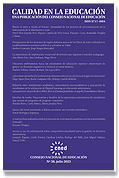What Are Future Teachers Learning About the Use of Technologies in the Classroom?
DOI:
https://doi.org/10.31619/caledu.n58.1329Keywords:
Initial Teacher Training, ICT Courses, TechnologyAbstract
Teachers in the Chilean school system are required to integrate technologies into their educational practices, a demand increased during remote classes in an emergency context. The aim of this research is to examine the training in ICT (Information and Communication Technology) for future Chilean teachers based on the objectives and contents of the subjects that address the presence of ICT. This study utilized an exploratory-descriptive design, with a mixed methodology, analyzing 140 subject programs from 104 Pedagogy careers included in the CNED database. The results indicate that the pedagogical and technical dimensions have a greater presence compared to the ethical, professional development, and foundational dimensions. The emphasis of these dimensions is more pronounced between the first and fifth semesters of the programs. Notably, the training programs place significant emphasis on the pedagogical and professional dimensions in the areas of Natural Sciences, Arts and Music. Regarding accreditation, the study observes that the technical dimension is the most prevalent in careers with more years of accreditation.
Downloads
Published
Issue
Section
License
Authors retain their Copyright and only transfer a part of these to the journal, accepting the following conditions:
Authors keep their rights as authors and guarantee the right to the journal for the first publication of their work, which is simultaneously subject to the Creative Commons Attribution license allowing third parties to share the study accrediting the author and first publication in this journal.
Authors may adopt other non-exclusive license agreements for distribution of the version of the published work (e.g. inclusion in an institutional thematic file or publication in a monographic volume) accrediting initial publication in this journal.
Authors are allowed and recommended to share their work over the Internet (e.g. in institutional telematic files or their website) before and during the submission process, which may lead to interesting exchanges and increased citation of the published work. (See The effect of open access).

